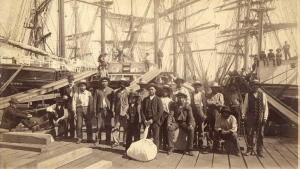Vancouver, BC – The history of labor unions in Canada is often associated with the struggles of European immigrants in the late 19th and early 20th centuries. However, the story of Vancouver’s first workers’ union actually begins with a group of local Indigenous longshoremen.
In the late 1800s, the city of Vancouver was rapidly growing as a major port on the west coast. The demand for labor in the shipping industry was high, and many Indigenous people from nearby First Nations communities were drawn to the city for work.
Despite their crucial role in the city’s economy, these longshoremen faced discrimination and exploitation from their employers. They were often paid lower wages and denied basic rights and benefits.
In response to these injustices, a group of Indigenous longshoremen came together to form the Vancouver Longshoremen’s Union in 1902. Led by Squamish Nation member Dan George, the union aimed to improve working conditions and fight for fair treatment of its members.
The union’s first major victory came in 1903 when they successfully negotiated a wage increase for their members. This was a significant achievement, as it was the first time that Indigenous workers in Vancouver had organized and collectively bargained for better pay.
The union continued to grow in the following years, with members from other First Nations communities joining their cause. They also formed alliances with other labor unions in the city, such as the International Longshoremen’s Association, to strengthen their bargaining power.
In 1907, the Vancouver Longshoremen’s Union became the first union in Canada to secure a closed shop agreement, which meant that all workers in the industry had to be union members. This was a major milestone for the labor movement in Canada and set a precedent for future unions to follow.
The union’s success did not go unnoticed, and it inspired other Indigenous workers across the country to organize and fight for their rights. In 1911, the Vancouver Longshoremen’s Union changed its name to the Brotherhood of Longshoremen, and its membership expanded to include non-Indigenous workers as well.
Today, the union is known as the International Longshore and Warehouse Union (ILWU) Local 500 and continues to represent workers in the shipping industry in Vancouver. Its founding by Indigenous longshoremen serves as a reminder of the important role that Indigenous people have played in shaping the labor movement in Canada.
As we reflect on the history of labor unions in Canada, it is crucial to recognize the contributions of Indigenous workers and their fight for fair treatment and better working conditions. The Vancouver Longshoremen’s Union, founded by local Indigenous longshoremen, will forever hold a significant place in the country’s labor history.



